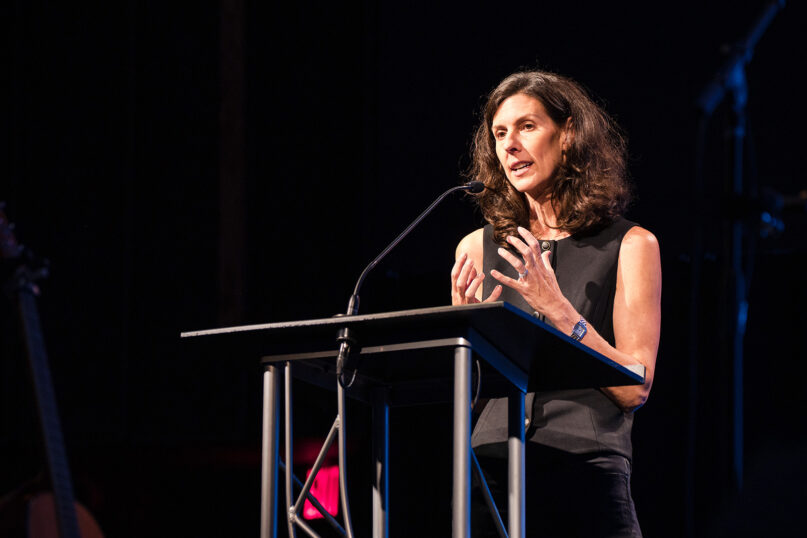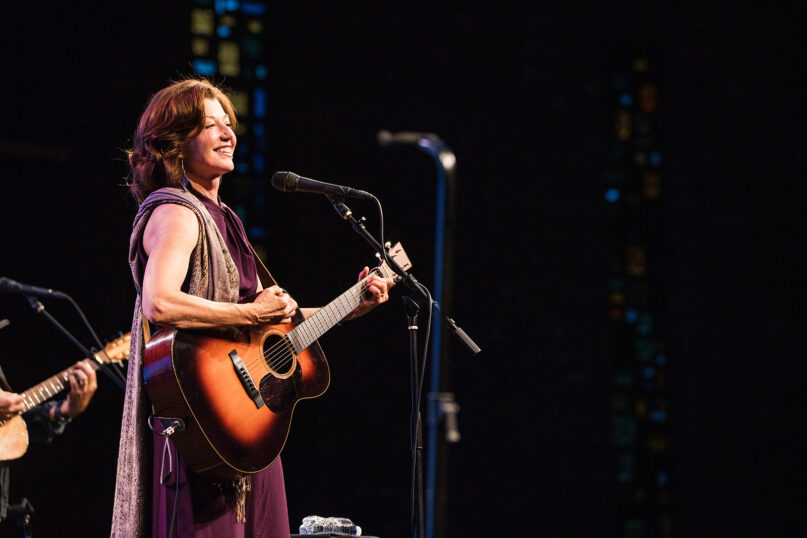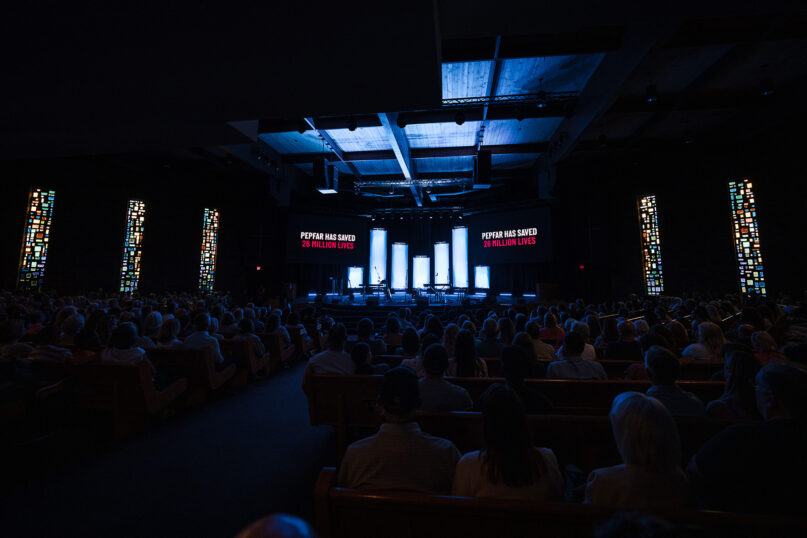NASHVILLE, Tenn. (RNS) –On a warm June evening, Christian music legend Amy Grant finished up a set at church in Brentwood, a music celebrity-laden suburb of the country music capital, set down her guitar and picked up her phone.
“I’ve never done this before,” Grant said from the stage at Otter Creek Church, as she dialed the Washington office of Tennessee Sen. Bill Hagerty.
After getting through to voicemail and introducing herself, Grant launched into an appeal for continued support to fund the President’s Emergency Plan for AIDS Relief — a George W. Bush-era federal program known as PEPFAR that the Trump administration has threatened to defund.
“We want you to know that here in Nashville, we want to see full funding of PEPFAR so that we can stay on track to end the HIV AIDS epidemic by 2030,” Grant said in a moment caught on video. Audience members, who had come to the church to help raise awareness about PEPFAR, hooted their support.
After hanging up, Grant urged audience members to follow her example. “What if everyone called?” she said. “That is democracy — to use our voice.”
Despite its history of bipartisan support and long success — PEPFAR has been credited with saving 26 million lives around the world — the program’s future is uncertain. The White House Office of Management and Budget, led by Russ Vought, is seeking to cut $400 million in funds already approved for the current fiscal year, through a process known as rescission.
The administration has proposed a further $1.9 billion in cuts in the program for the upcoming fiscal year, on top of cuts to the U.S. Agency for International Development, which has funded clinics that delivered AIDS medications.
A new report in the Lancet estimated that cuts to USAID programs, including PEPFAR, could lead to more than 14 million deaths by 2030, including more than 4 million children under 5

“We have got to do something,” said Jenny Dyer, founder of The 2030 Collaborative, a consulting firm in Nashville that advocates for global health and development issues, in a recent interview. “We can’t let these cuts happen.”
A former faith director for the One Campaign, co-founded by U2 lead singer Bono, Dyer is also the former executive director of Hope Through Healing Hands, a humanitarian group founded by Bill Frist, a physician and former U.S. senator who was a key early supporter of PEPFAR as Senate majority leader.
She’s long seen the important role that evangelical groups have played in supporting PEPFAR and hopes that once again faith leaders will rally to support the program.
Dyer said that for much of its history, PEPFAR had the support of major evangelical leaders such as Rick and Kay Warren of Saddleback Church in Orange County, California, and Bill and Lynne Hybels of Willow Creek Community Church near Chicago. Before the program was approved in 2003, they and other megachurch pastors of their generation helped the Bush administration overcome the stigma around AIDS among conservative Christians.

Kay Warren had seen the devastation of the AIDS epidemic firsthand while visiting clinics in Africa, something Warren recounted in a 2007 interview for Sojourners magazine. She recalled meeting a woman in the clinic who was dying of the disease, who asked for prayer. “Who will care for my children when I am gone?” Warren recalled her asking.
Frist spoke by video at the Otter Creek event, and he recounted his own encounters with the devastation of the AIDS epidemic while on medical mission trips to work at clinics in sub-Saharan Africa. “Three million people a year dying of HIV/AIDS at the time,” said Frist.
Frist told the audience about a 2002 dinner at the White House where President George W. Bush discussed his plans for the program to combat the AIDS epidemic and about the role that pastors and Christian musicians might play in rallying support. No one knew at the time if it would work, he said.
Now there is proof, he said.

“We are just five years away from the end of the HIV/AIDS pandemic,” Frist said. “Now is not the time to back away. We need Congress to see this through to keep the faith. And to finish the race.”
But leaders like Frist, who left office in 2007, and the Warrens, who stepped down from leadership at Saddleback in 2022, are no longer in place. Many younger church leaders have no firsthand recollection of the AIDS crisis, when support for PEPFAR grew.
“We have to go back to the people in the pews,” Kay Warren told RNS in late June.
a researcher who worked for 20 years on AIDS prevention programs, worries that much of the progress in fighting the AIDS epidemic could be lost with the cuts to PEPFAR.
Torjesen, who was recently named president of BioLogos, a Christian nonprofit that makes connections between faith and science leaders, hopes other Christians will be willing to see PEPFAR as what she called kingdom work — taking the blessings that the United States has received and the medical advances here and sharing them with others.
“Can we at least agree that we are called by Christ to serve others?” she said. “That is a starting point.”
Asia Russell, executive director of Health GAP, an activist group that supports funding for PEPFAR, is skeptical that evangelical groups will be able to hold off cuts to the program.
Russell, whose group protested at a Senate Appropriations Committee hearing in June where cuts to PEPFAR were discussed, argues that few Republican leaders will oppose the Trump administration’s budget cuts to humanitarian aid. “It’s not about bringing the band back together,” said Russell. “It’s about the fact that Donald Trump is willing to let people die.”
Josh Graves, the preaching and teaching minster for Otter Creek, said he became aware of the cuts at USAID and other programs, like PEPFAR, through his friend Mark Moore, who runs a nonprofit that produces a vitamin-fortified version of peanut butter used in food programs that combat malnutrition.
Graves has been concerned about how Trump administration cuts through the Department of Government Efficiency program started by Elon Musk would affect “real Christian people doing really good Christian things.”

Graves said that, at least in Nashville, there’s a hunger for public policy that “looks like Jesus,” shaped by justice and compassion rather than what he called the “empty calories” of polarization.
“I think there’s a group within Nashville and other cities that are hungry for clarity about how to take the red letters of Jesus and apply them into real-world situations,” he said, referring to Bible publishers’ practice of highlighting the words of Jesus in red ink.
At Otter Creek, Grant was joined onstage by Christian songwriter and producer Charlie Peacock, who recalled the heady days of getting PEPFAR passed a quarter-century ago. As Bono toured in 2002 to rally churches to support AIDS relief, the singer stopped in Nashville to ask musicians and other Nashville leaders to join the cause. The meeting with Bono was held at Peacock’s house.
Peacock hopes that once again evangelicals will speak up for AIDS relief. That support will be needed, he said, as the current administration doesn’t share the kind of “compassionate conservatism” that inspired Frist or Bush. Peacock said that supporting PEPFAR is more spiritual than it is political.
“And for many Christ-followers around the U.S. — around the globe — the care of orphans and widows, those in need of lifesaving meds, is never off the table,” he told RNS. “ It is as front and center as ever.”
Original Source: